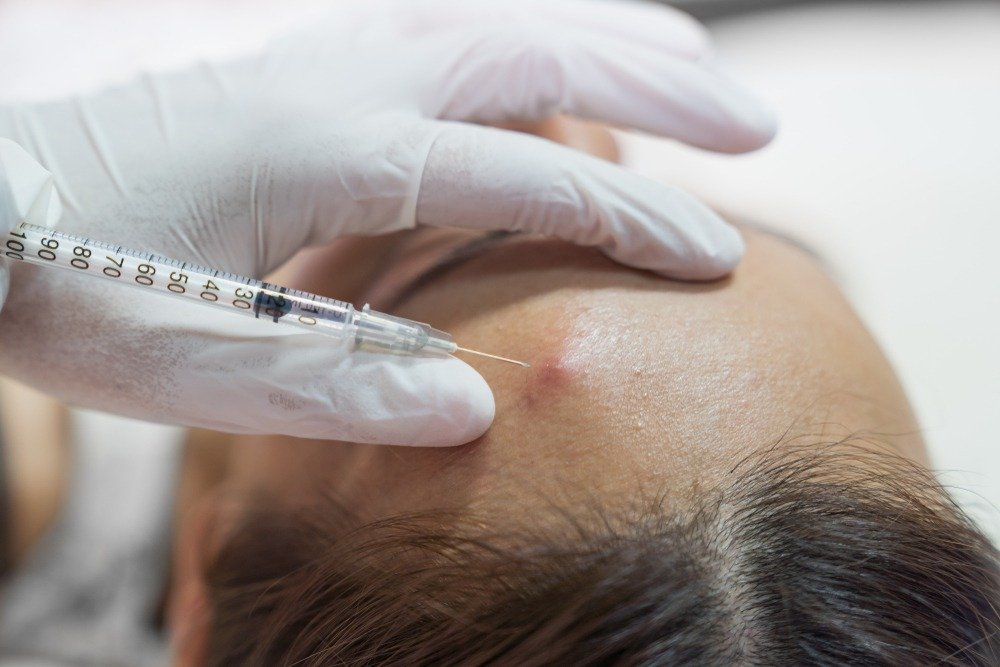
Acne
Are you tired of dealing with stubborn acne that just won't go away?
What is Acne?
Acne is a common skin condition that occurs when hair follicles become clogged with oil and dead skin cells. It usually manifests as pimples, blackheads, whiteheads, or cysts and can appear on the face, chest, back, shoulders, and other areas of the body.
Acne can be frustrating and affect individuals of all ages, but with the right knowledge and tools, you can effectively manage and minimize its impact on your life.
To effectively combat acne, it's crucial to understand its causes and contributing factors. Hormonal imbalances, excess oil production, bacteria, clogged pores, and inflammation are some of the primary culprits.
Genetic factors, stress, diet, and certain medications can also influence the development and severity of acne.
Types of Acne:
Acne comes in various forms, each with its own characteristics and treatment approaches. Common types include:
Whiteheads
Small, flesh-colored bumps that occur when pores become clogged with oil and dead skin cells.
Blackheads
Open comedones that appear black due to oxidation of trapped debris.
Papules
Small, red, and inflamed bumps that can be sensitive to touch.
Pustules
Similar to papules, but with a white or yellowish center filled with pus.
Nodules
Large, painful, and deeply embedded bumps beneath the skin's surface.
Cystic Acne
Severe acne that leads to large, tender, and pus-filled cysts.
Cleanse Regularly
Gently wash your face twice a day with a mild cleanser to remove dirt, oil, and makeup.
Healthy Diet
Incorporate a balanced diet rich in fruits, vegetables, whole grains, and lean proteins while minimizing processed foods and sugar.
Hands Off
Avoid touching your face throughout the day to prevent the transfer of bacteria and oil.
Prevention Tips
Preventing acne is often better than treating it. Here are some tips to keep your skin clear and blemish-free:
Sun Protection
Always use sunscreen with at least SPF 30 to shield your skin from harmful UV rays that can worsen acne and cause scarring.
Hydration
Drink plenty of water to keep your skin hydrated and flush out toxins.
Stress Management
Find healthy ways to manage stress, such as exercise, meditation, or engaging in hobbies.
Treating Acne
The good news is that acne is a treatable condition, and there are numerous options available to help you achieve clearer skin. Here are some common treatments:
Topical Products: Over-the-counter creams, gels, and cleansers containing ingredients like benzoyl peroxide, salicylic acid, or retinoids can help unclog pores and reduce inflammation.
Prescription Medications: Our doctors may prescribe stronger topical treatments or oral medications such as antibiotics, hormonal therapy, or isotretinoin for severe cases.
Professional Procedures: Dermatological procedures like chemical peels, microdermabrasion, laser therapy, or cortisone injections can be effective in reducing acne and improving the skin's appearance.
Lifestyle Changes: Adopting a skincare routine, maintaining a balanced diet, managing stress, and avoiding pore-clogging cosmetics can all contribute to preventing and managing acne.
Ready to say goodbye to acne and hello to clear, healthy skin?
Here are the Professional Treatment for Acne
Professional treatments for acne can be highly effective in combating stubborn breakouts and achieving clearer skin. Here are some commonly used professional treatments:
Chemical Peels
A chemical peel involves applying a solution to the skin to exfoliate dead skin cells and unclog pores. This treatment helps reduce acne, improve skin texture, and fade acne scars.
Microdermabrasion
This procedure uses a specialized device to gently exfoliate the outer layer of the skin, promoting cell turnover and reducing acne. It can also help with the appearance of acne scars.
Cortisone Injections
For severe acne lesions, such as cysts or nodules, cortisone injections can be administered by a doctor. This treatment reduces inflammation and speeds up the healing process.
Extraction
Our doctors or estheticians can perform professional extractions to remove comedones (blackheads and whiteheads) using sterile instruments. This helps clear clogged pores and prevent further breakouts.
Photodynamic Therapy (PDT)
PDT involves applying a photosensitizing agent to the skin and then exposing it to a specific light source. This treatment targets acne-causing bacteria, reduces oil production, and shrinks sebaceous glands.
Prescription Medications
Our doctors may prescribe topical medications, such as retinoids, benzoyl peroxide, or antibiotics, to effectively treat acne. Oral medications like antibiotics, hormonal therapy, or isotretinoin (Accutane) may also be recommended for severe or resistant cases.
Laser Therapy
Laser treatments target bacteria, reduce oil production, and promote collagen production to improve acne. Different types of lasers, such as pulsed dye laser or fractional laser, may be used depending on the severity and type of acne.
It's important to consult with a qualified dermatologist to determine which professional treatment options are suitable for your specific acne condition. They will assess your skin, discuss your goals, and recommend the most appropriate treatment plan to help you achieve clear and healthy skin.
Ready to say goodbye to acne and hello flawless skin?
It's time to schedule a consultation at Delight Medical & Aesthetics. Our dedicated team will assess your needs, create a personalized treatment plan, and support you on your journey to achieving clear, healthy, and radiant skin. Don't let acne hold you back any longer—experience the transformative results that Delight Medical & Aesthetics can provide.





















